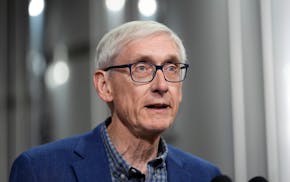Medtronic CEO William Hawkins III unexpectedly announced his retirement on Monday after a three-year tenure in which the medical device giant struggled to develop new blockbuster products to replace its traditional moneymakers.
Hawkins, 56, will step down April 29, the end of the Fridley-based company's fiscal year. Although Medtronic tends to groom its chief executives internally, the company said it will look outside for Hawkins' replacement.
Questions inevitably swirled over whether the career transition was of Hawkins' choosing. Leerink Swann Research analyst Rick Wise called his decision to retire "astonishing and unexpected."
But Medtronic spokesman Steve Cragle said Hawkins "informed the board of his intent to retire at the end of this fiscal year. It would be inappropriate to infer anything more from this information."
Hawkins, a bio-engineer who is a med-tech industry veteran, became CEO in August 2007 and chairman a year later, leading Medtronic during one of its most tumultuous periods.
Wall Street analysts said the change in Medtronic's upper management represents a significant transition for the $16 billion company and for a maturing medical technology industry.
In that vein, Morgan Stanley analyst David Lewis called plans for an external search encouraging. "External expertise could be helpful given the challenges Medtronic is facing," he wrote in a note to investors.
In recent years, sales of the company's big moneymakers -- heart defibrillators and spine surgery devices -- have slowed considerably, and no clear blockbuster products have emerged as replacements. Medtronic faces cutthroat competition from rivals Boston Scientific Corp. and St. Jude Medical Inc., its stock price has declined 30 percent, and investigations have probed the millions it has paid physician consultants.
Health care reform, more-stringent device regulations and insurance reimbursement pressures loom. And a lagging economy has caused some patients to delay medical procedures involving the company's products.
"There's been a big gap in the introduction of meaningful new products, so the company has been at the mercy of macro forces," said Phil Nalbone, an analyst at Wedbush Securities.
Hawkins declined to be interviewed Monday, but in a news release he said he's proud of what he's accomplished at Medtronic, which he joined in 2002 after previous stops at a variety of medical technology companies. "We made the right investments in talent, quality and innovation to position the company for long-term growth and future success," he said.
Strategic moves
During Hawkins' tenure, Medtronic made several key acquisitions, including CryoCath Technologies Inc. for $380 million and Ablation Frontiers Inc. for $225 million, both players in treating the heart condition atrial fibrillation. More recently, Medtronic purchased Plymouth-based ATS Medical Inc., primarily a heart valve firm, for $370 million, and paid $800 million for Ardian Inc., which is developing a device to treat high blood pressure.
Under Hawkins, Medtronic launched a drug-coated heart stent to treat clogged arteries in 2008 -- nearly five years after Johnson & Johnson launched the same type of product in the United States.
Hawkins also inherited the difficult integration of spinal devicemaker Kyphon Inc., which Medtronic bought for $4 billion shortly before he was named CEO. And the company agreed in October to settle more than 8,000 patient lawsuits for $268 million related to the 2007 recall of a heart defibrillator wire.
One of Hawkins' signature projects was a strategy called "One Medtronic" that integrated Medtronic's disparate businesses. "When I first came on board, I challenged the organization: Are we going to continue to be a portfolio company or are we going to really reconnect as One Medtronic?" Hawkins said in an interview with the Star Tribune last spring. "How do we make the whole greater than the sum of the parts?"
Going forward, Leerink Swann analyst Wise said "everything will be on the table" for a new leadership team, including "rethinking the portfolio."
Hawkins' tenure has been dogged by persistent questions about the company's paid consulting relationship with physicians. While the company maintains doctor input is critical to discover new medical devices and perfect existing ones, these partnerships have attracted investigations by Congress and the U.S. Department of Justice and prompted several whistleblower lawsuits.
Under Hawkins' watch, Medtronic supported federal legislation, now law, that will require drug and medical device companies to publicly disclose these payments. Last May, the company was one of the first med-tech companies to disclose payments on its own website.
Medtronic shares closed Monday at $37.62, up 22 cents.
Janet Moore • 612-673-7752

Wisconsin Republicans ignore governor's call to spend $125M to combat 'forever chemicals'
Stock market today: Most of Wall Street slips as expectations rise for rates to stay high
Police make arrests a year after theft of gold and cash worth millions at Toronto's Pearson airport
Retired general's testimony links private contractor to Abu Ghraib abuses

